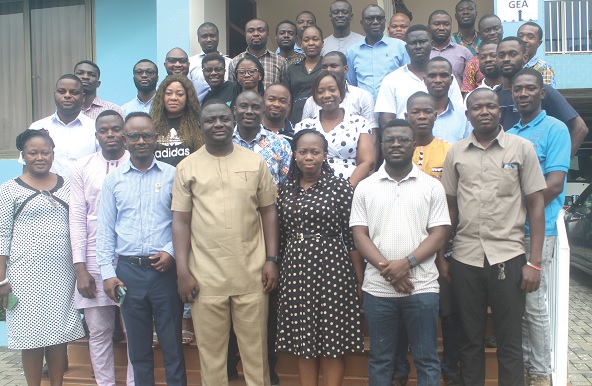
GEA schools trainers on occupational safety, health
The Ghana Employers Association (GEA) has organised a workshop to educate its trainers on Occupational Safety and Health (OSH) guidelines to help eliminate occupational hazards and risks at the workplace.
The two-day workshop, which was held in Accra last Thursday, was aimed at providing its members with effective training techniques to disseminate OSH knowledge and practices to their colleagues at the workplace while enhancing the understanding of the guidelines developed by the association specific to the manufacturing sector.
Targeted at professionals in the manufacturing sector, the training was also to equip the participants with diverse expertise, including risk assessment and control management, among others, to ensure that they gain valuable insights which would enable them to implement best practices at the workplace.
Workshop
Addressing participants in the workshop, the Director of Industrial Relations of GEA, Joseph Kingsley Amuah, said proactive management of OSH-related issues was critical for enterprise development and the well-being of workers.
However, the absence of a unique and standard OSH framework has affected the way and manner work-related injuries, accidents and near accidents at workplaces have been addressed.
This gap, he said, had resulted in huge expenses incurred by businesses to defray compensation to their workers who suffered various degrees of work-related injuries, fixing, replacing and installing equipment to maximise safety; thus, it was against this background that GEA had developed the guidelines to support employers and businesses to adequately mainstream the culture of OSH management in every workplace.
Guidelines
Mr Amuah said the guidelines came in four direct forms which included a generic one which served as an invaluable reference tool for all employers and workers, national institutions and other agents that played various roles in ensuring that workplaces in Ghana were safe and healthy.
The rest, he said, were the manufacturing, agriculture and construction sector OSH management guidelines which were generally to ensure that health and safety management in the workplace constituted a core management function that was ongoing and promoted a culture of cooperation between the major stakeholders.
Mr Amuah further encouraged that the sector adequately adapted the use of the guidelines to actively develop a sustainable safety culture at all workplaces.
“So let us remember that the true measure of our success lies not in the guidelines themselves but in their implementation across every factory floor and in the hands of every worker,” he added.
Policy
For his part, the Country HSSEC Manager of Blue Ocean Investments, Fred Asante Antwi, said health safety had become a global issue; hence, most companies needed to pay keen attention to health and safety issues at the workplace.
He said safety, in the long run, was profitable as when invested in would prevent future costs and boost productivity in the companies.
He took the participants through topics such as identifying hazards, risk assessment of risks and reviewing controls, among others, and how they can be applied in different company settings.
Mr Antwi further called on policymakers to take steps in producing a national safety policy that would ensure that the safety of employees at the workplace was protected.
